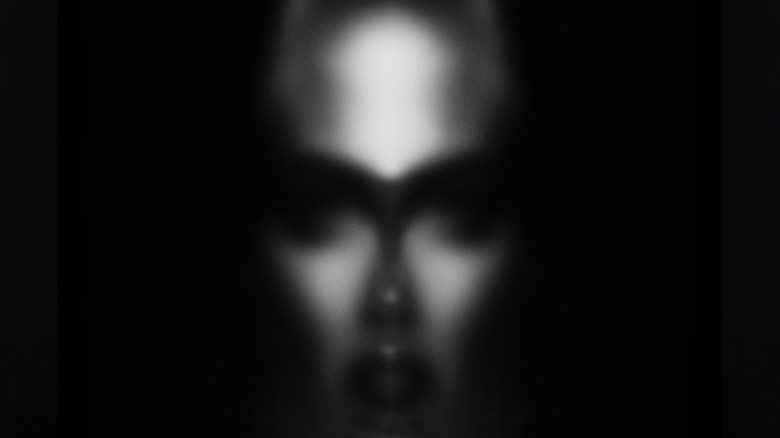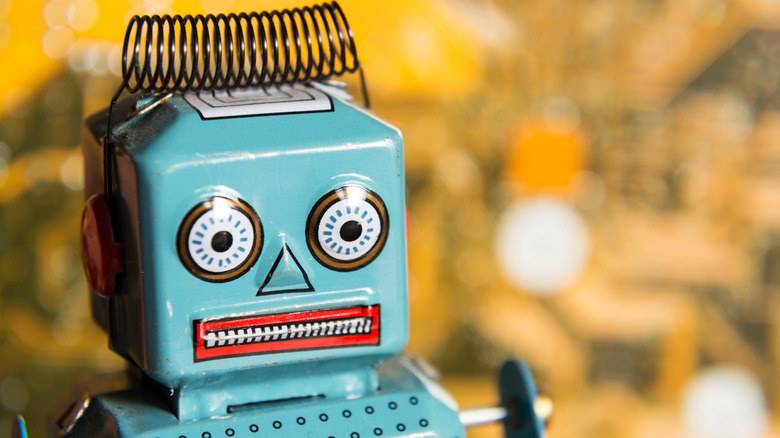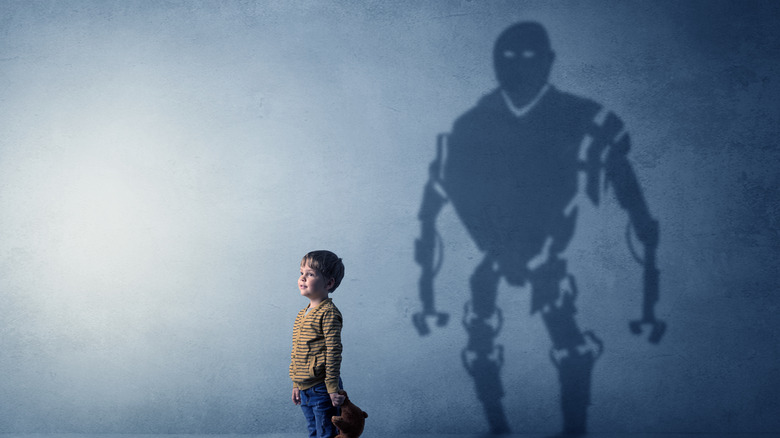The Internet Is Disturbed By The First AI Cryptid
As Microsoft, Google, and other tech giants have made clear, AI is the future of consumer technology. It can compose music. It could gain true self-awareness in our lifetimes. Per The Verge, people have tried, and thankfully failed, to give it our jobs.
In case all that isn't intimidating enough, according to IGN, AI also appears to have its very own computer-generated nightmares. Generative AI algorithms can now invent their own monsters, complete with unique names and consistent iconography. Perhaps the most chilling creation of AI to date is a lady called "Loab." Conceptual artist Steph Maj Swanson, who goes by "Supercomposite" on Twitter, fed an AI art generator a series of prompts, causing the algorithm to generate a chilling spectre: a bloodied woman with distorted features the system called "Loab."
Once Loab had been created, there was no stopping her. Further elaborations on the original prompts consistently created new images featuring the same figure in increasingly nightmarish circumstances. How Loab came to be, and why she has persisted in the online id, sheds light on both the functional principles of AI and the ways in which human input shapes the future of algorithms.
The legend of Loab
Fundamentally, Loab is an example of an AI art generator doing its job. Swanson was experimenting with "negative prompts" — search queries that, rather than giving an AI art generator concrete elements to elaborate on — request images be as different from the query as possible. Swanson's search string started with a simple one: "Brando:: -1." That is, she asked the generator for an image as unlike legendary actor Marlon Brando as possible. On receiving a nonsensical logo-like result, she reversed the query again, requesting something as unlike *that* image as possible. She expected to get back an image of, or at least resembling, Brando. If the first result was the opposite of Brando, then Brando should be the opposite of it.
That's not what happened. What happened was Loab, a woman with haunting, not-quite-human eyes and a face full of blood.
🧵: I discovered this woman, who I call Loab, in April. The AI reproduced her more easily than most celebrities. Her presence is persistent, and she haunts every image she touches. CW: Take a seat. This is a true horror story, and veers sharply macabre. pic.twitter.com/gmUlf6mZtk
— Supercomposite (@supercomposite) September 6, 2022
As Swanson and her collaborators continued to explore the AI tool, searches repeatedly retrieved the same chilling image. In Swanson's words, "something about this woman is adjacent to extremely gory and macabre imagery in the distribution of the AI's world knowledge." She and her collaborators, plus a growing fan base, have continued to elaborate on and expand Loab as a concept, which in turn feeds the AI database and gives it more "Loab" to work with.
The machine behind the ghost
Swanson sees Loab as a perfect proof of concept for her approach to AI art. As she put it, "the big lesson for me here with Loab is that image prompting can essentially be used as your custom vector to query the latent space." Swanson's "latent space" is all the ways ideas can fit together that people haven't yet explicitly expressed. In Loab, AI didn't "create a new cryptid," but, rather, it took images human artists had already created, assessed similarities according to its algorithm, and displayed them in an engaging way.
In short, the creation of Loab was a classic synthesis of human ingenuity and computerized iteration. The creativity behind Loab belonged to Swanson, her fans, and the artists the AI database exploited. Despite Loab's appearance, the process was wholly non-occult. It's just a computer program trying to give a user what she asked for. Chilling as Loab is, she's fundamentally the result of the same basic reasoning that makes a search engine complete a user's sentence ten different ways. Loab isn't a ghost in the machine, just a machine playing ghost.
Of course, we could be wrong. Loab, if you're reading this, a) SlashGear would love an interview; b) please don't be under our beds tonight.


